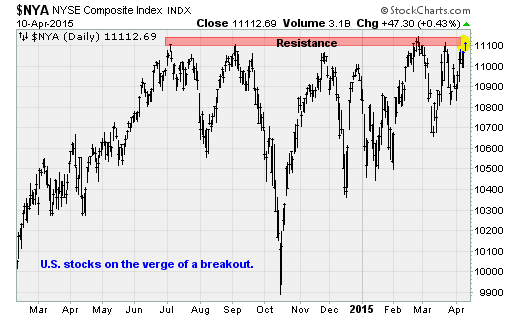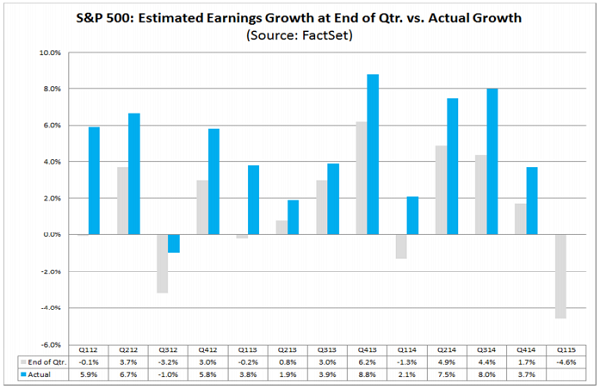Will U.S. stocks finally join the party?
American investors have been sort of left out of the stock market party so far this year, watching from afar as equities in China, Japan and Europe have soared, thanks to currency effects and the impact of cheap money stimulus. Year-to-date, Germany's DAX is up 26 percent, the Shanghai Composite is up 25 percent and Japan's Nikkei is up nearly 13 percent.
While the U.S. dollar has been a big winner, the NYSE Composite Index remains mired in a trading range going all the way back to July. That's right: Nearly a year of churning, turbulent action without much to show for it.
But that could be set to change. On Friday, stocks rallied to nudge up against this major resistance level -- threatening a breakout as first-quarter earnings season kicks off.
The catalyst is the growing realization that recent softness in the U.S. economic data -- specifically inflation measures and the March payroll report -- is likely to push back the timing of any Federal Reserve interest rate hike until September at the earliest. There's growing chatter that an early 2016 rate liftoff is the most likely outcome.
Minneapolis Fed President Narayana Kocherlakota buffed these expectations on Friday by saying the Fed should wait until the second half of 2016 to raise rates.
He added that he doesn't expect inflation and employment to hit the central bank's targets for three years and that increasing the cost of money now would take the economy in the wrong direction, reducing borrowing and spending at a time when signs of consumer confidence are starting to appear.
As a result, investors are piling into pro-cyclical areas of the market, including energy and semiconductors, that have recent fallen into short-term oversold conditions.
Whether a breakout can happen will depend in large part on the flow of the economic data and earnings results this week. Expectations have been greatly diminished heading into the reporting season as executives have warned of the drag from the robust U.S. dollar (which reduces the value of foreign profits) as well as the comedown in energy prices (which will hit energy earnings hard).
According to FactSet, earnings are expected to fall 4.8 percent on a year-over-year basis in the first quarter. If that happens, it would be the worst result since third-quarter 2012. Some 85 companies in the S&P 500 have issued negative guidance vs. 16 issuing positive guidance.
Estimates have been cut fast and hard, with analysts dropping their S&P 500 earnings expectation by 8.2 percent -- the largest decline in bottom-up earnings per share since the depths of the financial crisis.
Yet, the optimists say this game has been played many times before: Negative guidance lowers the hurdles, making upside surprises and post-earnings stock price gains easier. The chart above shows how this has worked over the last few years, with actual corporate results consistently beating end-of-quarter estimates.
Although Alcoa (AA) unofficially kicked off the first-quarter reporting season off on April 8, the volume of action will pick up this week with financial, technology and industrial names prominently featured. JPMorgan (JPM) and Wells Fargo (WFC) will report before the bell on Tuesday, with Intel (INTC) reporting after the close. Wednesday will see Bank of America (BAC) before the bell and Netflix (NFLX) after the close. Thursday features Citigroup (C) and Goldman Sachs (GS), while Friday will finish up with General Electric (GE), which catapulted nearly 11 percent on Friday on the news that it's selling off most of its GE Capital financial unit.
On the economic front, industrial production, retail sales, housing data and the March consumer inflation report will be closely watched. Retail sales disappointed in February for the third consecutive month. Now, with winter's chill fading, consumers will need to step it up. The inflation reports should reflect the stabilization in wholesale gasoline prices seen throughout March.
Overseas, a batch of data out of China, including industrial production and GDP, could provide more fuel to the rapidly expanding stock bubble there. And the eurozone will release industrial production numbers.
All in all, it will be a busy week that should go a long way toward letting us know whether U.S. equities will catch the wave sweeping most other stock markets higher -- or remain treading water.

